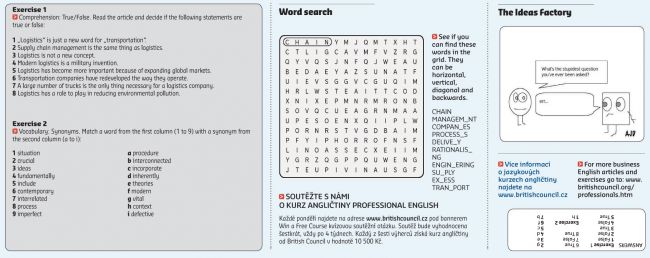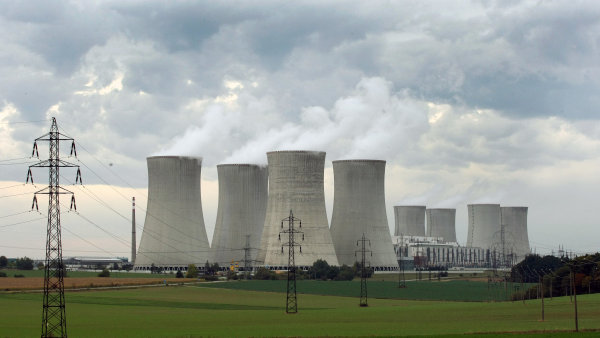For more business English articles and exercises go to: www.britishcouncil.org/professionals.htm
Více informací o jazykových kurzech angličtiny najdete na www.britishcouncil.cz
Logistics by Chris Rose
Pre-reading task
What do you understand by the term logistics?
Now, read the article and see if you are correct.
Logistics: a new word for an old process?
Giving old jobs or industries new, interesting sounding names is something which is often criticised today. Rubbish collectors have been called 'environmental waste operatives', and people who work in fast food restaurants "food preparation executives". Some people have suggested that 'logistics' is nothing but a new word for what used to called "transportation".
However, there is more to it than that. It is certainly true that transport is an important part of logistics, but logistics also involves other processes
Another common misunderstanding is that logistics is the same thing as supply chain management. Supply chain management, however, is only one part of logistics - its practical part.
Far from being a new, fashionable word, the term "logistics" was first used in a business context back in the early 1950s. It comes from military language: the improvement of supply processes has always been a vital part of military planning. Much modern logistics has its origins not only in recent theories of "just in time" management, but dates back to the Second World War. In the army, it was seen as a branch of engineering. The engineering department of the British army, the Royal Army Ordnance Corps, changed its name to the Royal Logistics Corps nearly 20 years ago.
Logistics has become so important because the changing world means it is necessary to radically rethink how products are delivered. And not only products: logistics also deals with the delivery of services, information, or energy - gas or electricity.
As has already been noted, logistics is more than just transportation. It also incorporates lessons from "just in time" and "total quality management", looking at overall processes (inventories, co-ordination of activities, and maximalisation of available resources), rather than just supply chains.
In a modern organisation, many different operations take place at the same time. All of these operations are interconnected, and have to reach the same project output. These operations take place on a global scale, involving different branches of a company, or different companies, who are possibly in different continents. This makes logistics - much more than delivering a package from point A to point B - a necessity.
Companies such as Norbert Dentressangle or Eddie Stobart have not just renamed themselves as 'logistics' organisations, but have actually rethought their entire working procedures. They are no longer just delivery companies with a fleet of trucks, but now work as logistics consultants, managing the supply chain from start to finish.
Not surprisingly, the way in which things are transported has become a significant question for companies attempting to cut their carbon emissions. Rationalising transportation processes is one crucial way of doing this. This has given rise to the field of 'reverse logistics'. Reverse logistics deals with problems of waste products, used packaging, and the return of defective or excess products.
 Přidejte si Hospodářské noviny
mezi své oblíbené tituly
na Google zprávách.
Přidejte si Hospodářské noviny
mezi své oblíbené tituly
na Google zprávách.
Tento článek máteje zdarma. Když si předplatíte HN, budete moci číst všechny naše články nejen na vašem aktuálním připojení. Vaše předplatné brzy skončí. Předplaťte si HN a můžete i nadále číst všechny naše články. Nyní první 2 měsíce jen za 40 Kč.
- Veškerý obsah HN.cz
- Možnost kdykoliv zrušit
- Odemykejte obsah pro přátele
- Ukládejte si články na později
- Všechny články v audioverzi + playlist





